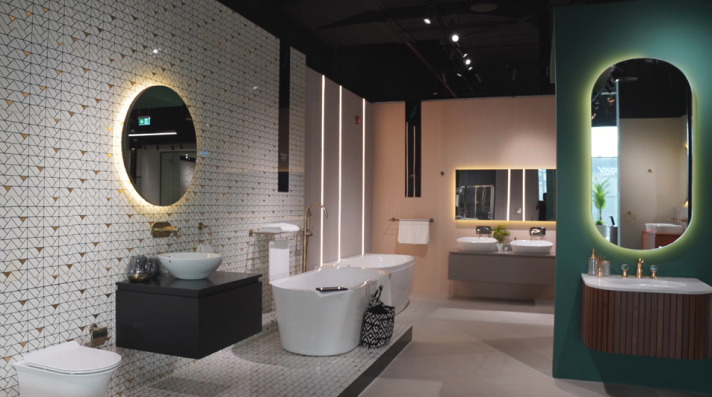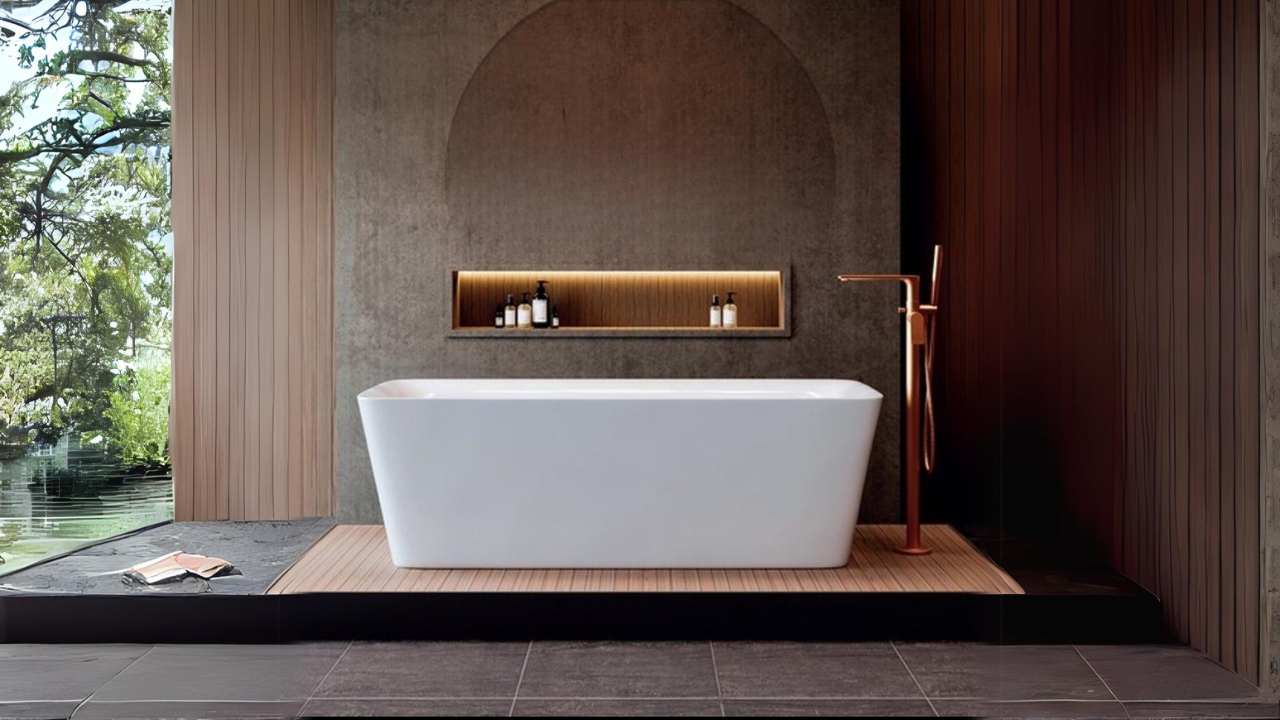Hard water stains can be a pain in any home—they leave behind ugly mineral deposits and residue on your shower doors, walls, floors, and fixtures. Although harmless, these hardheaded marks can mar the beauty of one’s surroundings. When water evaporates from hard water, it leaves behind minerals such as calcium, magnesium, and manganese. Eventually, these minerals will build up and create whitish or yellowish deposits that make your bathroom look less appealing.
Fortunately, with some effort, homemade solutions, and elbow grease, you can eliminate hard water stains from your shower and restore its surfaces to brand new status. This extensive tutorial provides five easy methods for removing hard water stains from ceramic tile, glass shower doors, fibreglass stalls, and all other bathroom areas exposed to moisture buildup over time. Shower problems can be sorted out with natural alternatives like vinegar, baking soda, and lemon juice, among others, just in case. Additionally, we will provide prevention tips so that you avoid future problems with hard water stains. Let us start!
Materials Needed for Removing Hard Water Stains

Credits: Canva
Before we dive into the step-by-step instructions for removing hard water stains, let's go over the basic materials and ingredients you'll need to have on hand:
- White vinegar or apple cider vinegar: the acetic acid in vinegar helps dissolve mineral deposits and cut through soap scum. Undiluted vinegar is a must for tackling tough stains.
- Baking soda: gentle but effective, baking soda is a natural abrasive that lifts stains when used in a paste. Avoid baking powders with added aluminium.
- Lemon juice: The citric acid in lemon juice also helps break down mineral residue. Freshly squeezed juice works best.
- Dryer sheets: Used dryer sheets can help buff away hard stainless steel water spots.
- Spray bottle: for applying vinegar or other cleaning solutions to vertical surfaces and controlling coverage.
- Clean spray bottle or bucket: for mixing up stain-fighting solutions.
- Scrub brushes and sponges: Look for brushes with stiff, sturdy bristles and abrasive scrub sponges to aid with scrubbing.
- Old toothbrushes are great for scrubbing in crevices and along grout lines.
- Microfiber cloths: gentler than paper towels, microfiber cloths help wipe away grime.
- Rubber gloves: To protect your hands during prolonged cleaning sessions. Consider long gloves for arm protection.
- Eye protection: Safety glasses or goggles will shield your eyes from splashes when scrubbing over your head.
- Plastic putty knife: helpful for chipping off stubborn mineral deposits.
- Grout brush: for removing stains from grout lines.
- Safety razor blades: useful for scraping off hardened stains in crevices or small areas. Use with extreme caution.
- Tile stone smooths and polishes restored surfaces after cleaning.
- Resealant (if needed): for resealing grout lines or caulked joints after cleaning.
Before you get started, assemble all necessary supplies and prep the shower space. Remove any bath mats, accessories, or shower caddies. You may want to plug the drain to keep the cleaning solutions contained. If using harsh chemicals like vinegar, open windows, turn on vent fans, and wear gloves and eye protection. Now let's get to work erasing those hard water stains!
Step-by-Step Guide to Removing Hard Water Stains from Your Shower

Credits: Canva
Here are 5 simple, safe methods to remove hard water stains from shower surfaces, along with step-by-step instructions:
Create a vinegar solution.

Credits: Canva
Vinegar is the hero ingredient when it comes to dissolving mineral deposits left behind by hard water. Thanks to the acetic acid, vinegar can break down and loosen calcium, lime, and other hardened stains with ease.
Follow these steps to whip up a stain-fighting vinegar solution:
- Pour undiluted white vinegar into a spray bottle. Apple cider vinegar also works.
- For extra scrubbing power, you can optionally mix in a bit of baking soda to form bubbling foam. Use approximately 1 tablespoon of baking soda for every 2 cups of vinegar.
- Shake the bottle to combine the ingredients and dissolve the baking soda.
- If desired, add several drops of your favourite essential oil, like lemon or eucalyptus, to counteract the vinegar smell.
- Spray the vinegar solution liberally over stained surfaces, allowing it to fully saturate the hard water residue.
Apply the vinegar solution to the stained areas

Credits: Canva
Once mixed, it's time to apply the vinegar solution to the shower. Focus on surfaces with built-up hard water stains like tile, glass, fibreglass, metallic fixtures, grout, and caulking.
Follow these application tips:
- Thoroughly coat all stained areas, allowing the vinegar to fully saturate the mineral deposits. Use a spray bottle for easy, controlled coverage.
- For vertical surfaces, start spraying from the top down so drips don't cause streaks.
- For extra-stubborn stains, consider pouring undiluted vinegar directly onto the affected area and letting it soak instead of spraying.
- Make sure to get vinegar into crevices, along grout lines, and around faucets and joints where stains tend to accumulate.
- Let the vinegar solution sit for at least 15-20 minutes before scrubbing to allow it time to break down mineral deposits. Longer is better for tough stains.
Let the solution sit for some time.
Now comes the important step—letting the vinegar sit and work its magic!
Here are some tips for this critical soak time:
- Allow the vinegar solution to settle on the affected areas for a minimum of 15–20 minutes. For tougher stains, let it sit for 1-2 hours.
- Set a timer so you don't forget, and let the vinegar dry out.
- Periodically re-wet and reapply vinegar to keep surfaces saturated.
- The longer you let the vinegar soak in, the more effective it will be at dissolving mineral buildup.
- Don't wipe or rinse the vinegar off before the time is up. Patience pays off for superior results!
- If vinegar drying out is an issue due to ventilation, consider covering treated areas with plastic wrap to lock in moisture.
- Come back once the soak time is complete to start scrubbing away stains.
Scrub the stains with a sponge or brush.
Once the vinegar has had time to loosen the mineral deposits, it's time to start scrubbing! This manual process removes the grime the vinegar treatment dissolved.
Follow these tips for effective scrubbing:
- Use a stiff-bristled scrub brush or abrasive sponge designed for tough cleaning jobs. This helps provide extra scrubbing power.
- Apply some elbow grease and use a circular scrubbing motion to lift stains. Start gently, then increase pressure as needed.
- Focus on one small area at a time for the best results.
- Re-wet brushes or sponges periodically with additional vinegar as needed.
- For tough crevices, use an old toothbrush for detail work.
- Use a grout brush or toothbrush to vigorously scrub stains from grout lines.
- Aim to scrub each area for at least 2–3 minutes for optimal stain removal.
- Some extremely stubborn stains may require repeat applications and scrubbing.
Rinse the area with water.

Credits: Canva
Once satisfied with the scrubbing results, it's time to rinse away the cleaning solution residue and reveal the fruits of your labour.
Follow these tips for rinsing:
- Thoroughly rinse vinegar-treated areas with warm water to flush away dissolved mineral deposits and cleaning product residue.
- A detachable shower head or hand shower wand makes rinsing easy.
- Alternatively, use clean sponges and buckets of fresh water to wipe surfaces clean. Change the water frequently.
- Make sure to remove all traces of vinegar, or it could leave behind streaks or a noticeable smell.
- Rinse from top to bottom to avoid drips causing new stains.
- Inspect closely to ensure the stains have been completely removed before moving on.
- Let the surface air dry fully before using the shower again.
Repeat if necessary
Hopefully, after scrubbing and rinsing you'll be left with gleaming, stain-free surfaces. However, some extremely stubborn deposits may require repeat cleaning.
If stains remain, simply repeat the process:
- Reapply vinegar and let soak for another 15-30 minutes. You can also try a lemon juice solution.
- Scrub again using a bit more elbow grease.
- Rinse thoroughly.
- Tackle any remaining stains by spot-treating small areas with straight vinegar and scrubbing vigorously.
- For a final polish, rub surfaces with a dryer sheet to enhance shine.
- Severe stains may require using a commercial calcium remover or slightly stronger acids like phosphoric or muriatic acid. Use extreme caution with these harsh chemicals.
- With some perseverance, you can outwit even the most stubborn shower stains. Soon you'll be enjoying a pristine, refreshed shower space.
Tips for Preventing Hard Water Stains in the Future
Removing existing hard water stains is just half the battle—you also need to take steps to prevent new stains from forming. Here are some simple tips to keep your shower surfaces stain-free for the long term:
Use a squeegee after showering

Credits: Canva
The simplest way to stop the accumulation of water spots is to squeegee off shower walls, doors, and fixtures every time you finish using them. In essence, this quick action eliminates most of the moisture, leaving little chance for evaporation and mineral buildup. Just a few swipes after every shower will keep surfaces much cleaner.
Install a water softener

Credits: Canva
Staining difficulties are caused by hard water. You can install whole-house water softeners that work by taking out minerals like calcium and magnesium, which would leave fewer dissolved solids behind. While it is an investment, having a water softener will prevent stains and mineral scaling throughout your plumbing system.
Use a showerhead filter

Credits: Canva
Filters for showerheads provide precise protection in the right places. These filters fit well, are inexpensive to buy, and contain elements such as KDF that trap the minerals in the water before they come out of the showerhead, where they will stain. Change cartridges according to the manufacturer's instructions.
Regular cleaning and maintenance
Cleaning doesn’t get much simpler than this. Simply make sure you regularly clean down all areas of your shower with a daily shower cleaner to remove soap scum and minerals before they turn into permanent stains. Pay attention to grout lines or seams that have gaps between tiles and recaulk them if necessary. Properly deep clean your shower 1-2 times each month for best results. In dealing with shower staining, prevention is worth a pound of cure!
Conclusion
In summary, hard water showers are among the most common problems arising from hard water minerals. However, even when not preventing it early enough, intense deposits can be removed through proper techniques using appropriate products. As discussed earlier, vinegar dissolves deposits while scrubbing helps rub away dirt; diligence restores dull showers to look like new ones again. Adopting habits such as squeegeeing after bathing, fitting in filters, and regular cleaning can keep these spots at bay once and forever.
FAQs
Below are answers to some frequently asked questions about removing hard water stains from showers:
Are there any commercial cleaners that can effectively remove hard water stains?
Yes, you can purchase specialty hard water stain removers from brands like CLR, Lime-A-Way, or Whink that contain acids or mineral dissolving ingredients tailored for tough calcium and lime deposits. Always exercise caution when using harsh chemicals, and follow instructions carefully.
Can I use vinegar or lemon juice on all types of shower surfaces?
Vinegar and lemon juice work well for most standard shower materials, like ceramic tile, glass, fibreglass, stainless steel, and chrome. Avoid using acids on softer surfaces like acrylic, plastic, or fibreglass tub surrounds, as it could damage the finish. Spot test first.
How often should I clean my shower to prevent hard water stains?
Ideally, give your shower a thorough scrub using a daily shower cleaner at least once per week to prevent soap scum and mineral buildup. Spot clean more frequently if you notice staining starting. Deep clean the entire shower at least monthly.
Are there any health risks associated with hard water stains?
Hard water stains are primarily an aesthetic concern and generally don't pose any serious health risks. Keeping your shower clean promotes better hygiene. The minerals that makeup stains, like calcium and magnesium, are not considered hazardous.
Will removing hard water stains improve the performance and lifespan of my shower?
Yes! Allowing hard water stains to build up unchecked can affect the function of your shower over time. Removing them improves water flow, temperature regulation, and component performance. Catching stain early keeps shower surfaces, fixtures, tile, and grout in better shape. Proper maintenance extends the life of your shower.
Jaquar Luxury Bathroom Solutions
Jaquar Group is an Indian brand that leads among the most trusted and complete bathroom solutions and lighting companies worldwide. If you want to build or renovate your bathroom, Jaquar offers a complete range of products that feature stylish, premium-quality designs as well as incorporating the latest technologies. The range of showers includes a wide variety of models to choose from, starting with the basic ones up to the newest product lines made in the Artize line-up for luxury bathrooms tailored exclusively for each customer using advanced engineering and industry-leading innovations by Jaquar itself. Now bring home the experience of joyous bathing through luxurious bath fittings that make your bathroom come alive every single day for years to come. For more information on various types of showers and designs available online, visit any JAQUAR showroom near you!


